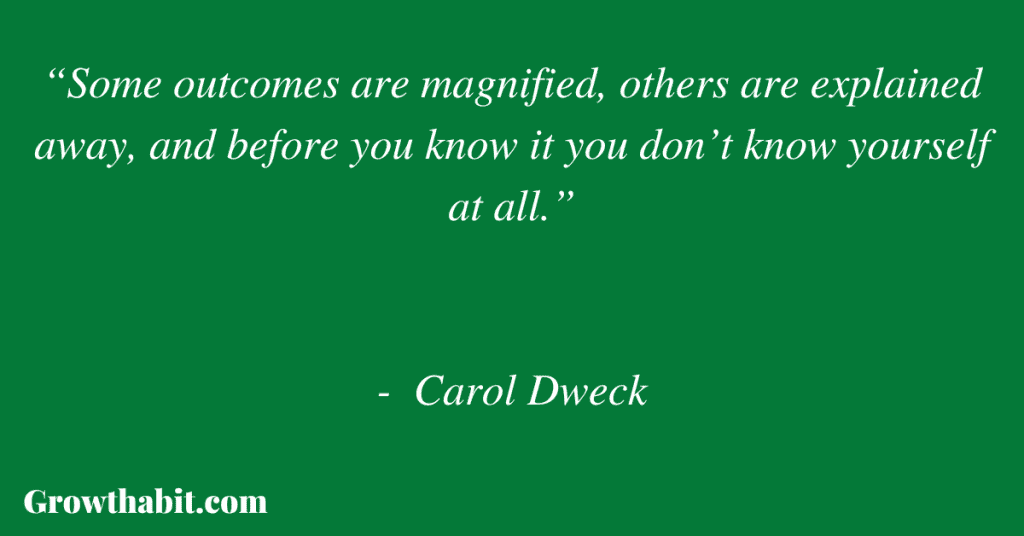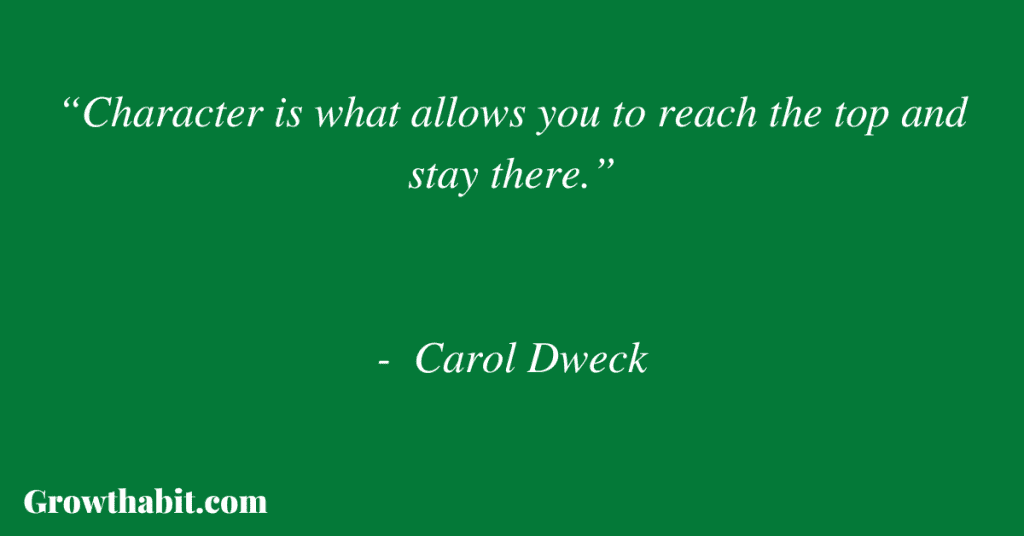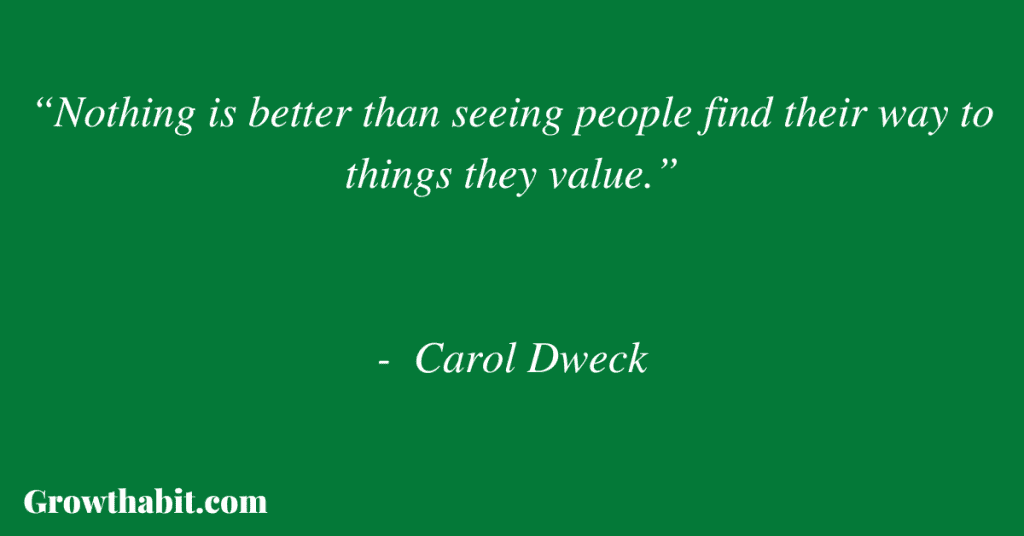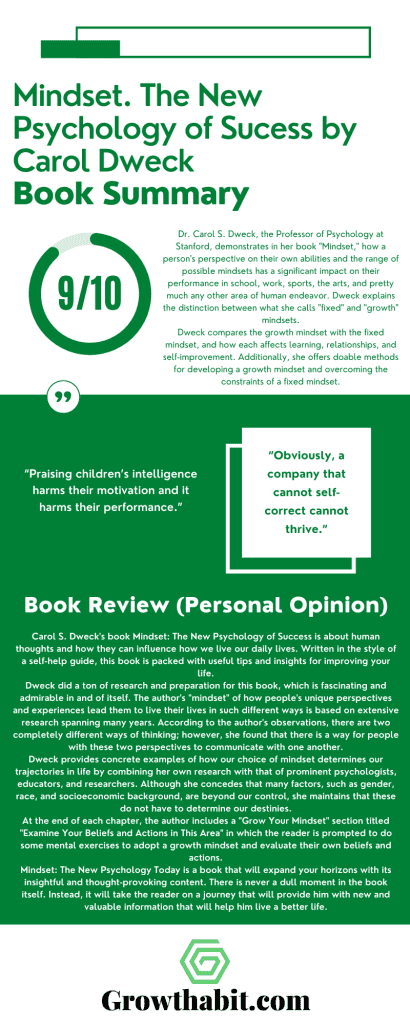Dr. Carol S. Dweck, the Professor of Psychology at Stanford, demonstrates in her book “Mindset,” how a person’s perspective on their own abilities and the range of possible mindsets has a significant impact on their performance in school, work, sports, the arts, and pretty much any other area of human endeavor. Dweck explains the distinction between what she calls “fixed” and “growth” mindsets.
Dweck compares the growth mindset with the fixed mindset, and how each affects learning, relationships, and self-improvement. Additionally, she offers doable methods for developing a growth mindset and overcoming the constraints of a fixed mindset.
Book Title— Mindset. The New Psychology of Success
Author— Carol Dweck
Date of Reading— March 2023
Rating— 9/10
What Is Being Said in Detail
INTRODUCTION
In response to student requests, Dr. Carol S. Dweck, wrote Mindset to disseminate the findings she and her students had made together in class, primarily that a “mindset,” rather than natural talents or abilities, determines failure or success in a given situation.
The purpose of Dweck’s book is to demonstrate how a shift in perspective can improve one’s outlook on one’s career, friendships, relationships, and pursuit of one’s goals. To achieve our goals, we need to stop thinking of ourselves as static individuals and instead adopt a growth-oriented, open-minded perspective.
CHAPTER 1. The Mindsets
Dr. Carol Dweck has spent the past thirty years studying people who have achieved great success, finding that some of them reach their full potential while others remain average.
Dweck was surprised to see that some of the kids appeared to actively enjoy the harder puzzles when she observed children in a study where they were asked to solve progressively more challenging puzzles.
The author argues that while some kids will take their setbacks as definitive evidence of their inability or incapacity, others will see them through a different lens. They view setbacks as opportunities for growth, knowing that with each setback, they will gain valuable experience and knowledge that will help them become better performers.
The second group discovers that setbacks aren’t as terrible as they may have seemed at the time. She thinks the real question is whether you think talent is something you’re born with and just have to prove, or if you think it’s something you can hone and improve upon. A “growth mindset” describes the first mentality. A “fixed mindset” describes the second way of thinking.
People with a fixed mindset believe that their level of intelligence is immutable. They are extremely preoccupied with their intelligence and the other areas in which they excel.
On the other hand, they have a hard time taking on challenges because doing so could reveal their own shortcomings or insecurities. A person with a fixed mindset lacks the motivation to take on challenges and often has difficulty dealing with uncertainty as a result.
People who adopt a growth mindset view the world in a very different light from the get-go. They have a strong motivation to learn and grow as a result of their conviction that intelligence can be nurtured.
They welcome challenges because they know they will make them stronger. They see failure as a learning experience rather than a reflection of who they are, so they consider themselves winners no matter what the outcome.
Growth and skill acquisition are viewed as being dependent on putting forth an effort. Insightful data can be gleaned from criticism and negative comments.
How you feel about the unchangeability of intelligence and personality traits, or the possibility of making major changes in both, is an indicator of your own mindset.
Dweck challenges the reader to put himself in the shoes of both mindsets, noting how those with a growth mindset are more likely to embrace challenges and see them as opportunities for development.
CHAPTER 2. Inside The Mindsets
To succeed, you must cultivate an understanding of your own identity. That’s why it’s crucial that you know what goes into your decision-making process. When you know yourself inside and out, you have a better grasp of your abilities and limitations.
The journey to knowing oneself can take many forms. The Myers-Briggs Type Indicator, the Predictive Index, and the StrengthsFinder are just a few of the personality tests available.
You can learn about your own decision-making processes by keeping a journal in which you record your predictions for the outcomes of various choices and then compare these predictions with the actual outcomes.

There is a distinction between these two perspectives on the importance of external validation and approval of our own success and excellence. People with fixed mindsets are constantly trying to win the approval of those around them.
To put it another way, they are seeking external validation of their abilities. Those who have a growth mindset don’t do that, not because they don’t care what other people think of their achievements, but because they don’t need other people’s approval to achieve their goals.
It is crucial that we are able to tell the difference between a growth mindset and a fixed mindset, as this can have profound effects on our outlook on the world.
CHAPTER 3. The Truth About Ability And Accomplishment
People with a fixed mindset regard effort as a waste of time and energy, whereas those with a growth mindset recognize the importance of such efforts in expanding one’s intelligence and achieving one’s goals.
Carol Dweck’s Ph.D. dissertation focused on the difference between a fixed and a growth mindset. Her experiment investigated how a person’s attitude toward their own failures affected their performance.
The theory was that when inability was perceived as the root cause of failures, people would become inhibited or lack confidence in situations where they had previously excelled. On the other hand, difficulties and challenges can motivate you to work even harder.
Dweck and her team conducted an experiment on “helpless” elementary school students to test this theory. In fact, they discovered that if the kids encountered a few math problems they couldn’t solve, they lost the ability to solve problems they had previously mastered, and for some, this loss of ability lasted for days.
The group then worked with half of the students, teaching them to blame themselves for their failures while also encouraging them to try again. These young people learned to persevere in the face of adversity and achieve their goals. The non-treatment group made no progress and continued to deteriorate quickly, recovering only slowly.

Dweck’s research found that “their goals” distinguished students who persevered in the face of adversity from those who gave up. Progress toward “learning goals” or “performance goals” can be influenced in a variety of ways.
Dweck also addresses the issues that contribute to individual differences in how much emphasis is placed on various goals. She concludes that people with a growth mindset perceive ‘ability’ differently than people with a fixed mindset.
If you have a fixed mindset, you expect a certain level of performance from yourself and believe that your natural talent is fixed. When you adopt a growth mindset, you believe that intelligence can be developed and that the challenges that come with learning are exciting.
There are things you can do to improve if you have a fixed mindset and realized it while reading this summary. Dweck advises us to think about our heroes and the qualities that make them so admirable.
Do the people you admire appear to have risen to prominence with little effort on their part? If this is the case, inquire about the effort that led to their success. Make sure you’re pushing yourself by setting lofty goals. Then, make a promise to yourself that no failures or difficulties will deter you from your quest.
Failures and defeats can be highly instructive if we take the time to reflect on what went wrong and apply what we’ve learned to future attempts at the same challenge. Failure and defeat have the potential to motivate us, and they frequently do. When we’ve worked hard to get there because of that inspiration, success tastes much better and is more rewarding.
CHAPTER 4. Sports: The Mindset of a Champion
Many people believe that natural talent alone is sufficient to reach the pinnacle of any field of endeavor, including sports. This false belief, however, is typical of people with fixed mindsets.
The evidence for the success that can be achieved through effort and training is all around us, and this is consistent with the belief that a growth mentality can be developed.
A gifted athlete risks being stymied by his or her own abilities. The main reason for this is that gifted people tend to overvalue their natural abilities while undervaluing the value of consistent, hard work.
The distinctions between fixed and development mindsets are most visible in how they interpret an individual’s behavior.
Athletes who are widely regarded as “naturals,” such as Michael Jordan, Babe Ruth, and Jackie Joyner-Kersee, required countless hours of hard work to achieve their peak levels of performance.
In comparison, Boston Red Sox pitcher Pedro Martínez succumbed to the fixed mindset. Because he was constantly praised, he began to believe that any shortcomings were the result of outside influences. When the Red Sox began losing to the New York Yankees in October 2001, Martínez went on a rant, attacking his own coach and threatening players.
His inability to overcome adversity resulted in a disastrous outcome, and the Yankees went on to win the game.

The conceptual distinction between fixed and development mindsets is again at work here, and this is where a person’s personality really shines through.
While those with a fixed mindset place undue emphasis on natural ability, those with a development mindset recognize that talent is only partially utilized before it reaches its full potential in the absence of practice.
When you have a champion’s mentality, you understand that everyone around you is important, regardless of the sport you play.
CHAPTER 5. Business: Mindset And Leadership
Carol Dweck’s research has expanded to include an examination of company-wide mindsets. Dweck and her new research team polled employees from seven large organizations to determine their level of agreement with phrases intended to indicate whether their workplace fostered a fixed or development mentality.
The authors of the study wanted to know if managers with a growth or fixed mindset had a more positive or negative impression of their employees, as well as if employees were more satisfied with their jobs, coworkers, and opportunities for innovation, ethics, and collaboration.
Employees of both growth-oriented and fixed-orientation businesses expressed a similar level of agreement when polled. Employees with a fixed attitude in a company were more likely to report that only a few “star” employees received preferential treatment.
They had less faith in the company and were less committed to their jobs than those who worked for companies with a growth mindset. Because they were afraid of failing, they tried fewer new things and were more likely to lie, steal, and take shortcuts.
Employees who have a “growth mindset” are more likely to have the following favorable attitudes toward their employer:
- 47% believe their coworkers are trustworthy;
- 34% believe they are loyal and committed to the company;
- 5% believe they are encouraged to take risks; and
- 49% believe the company supports innovation.
Companies can foster a growth mindset by providing opportunities for professional development (such as paid training and educational grants), encouraging employees to look internally for new hires, and offering financial incentives for creative problem-solving.
CHAPTER 6. Relationships: Mindsets In Love (Or Not)
It’s no surprise that a fixed mindset can destroy even the strongest friendships and partnerships. A “stuck perspective assures relationship suffering, and even disaster,” says relationship expert Rinatta Paries.
This is especially troubling because she believes that the majority of men and women have a fixed worldview when it comes to romantic relationships.
The majority of singles agree that finding the right partner is critical to having a successful romantic relationship. Many people believe that once they’ve found “the one,” their relationship will run smoothly and provide a solid foundation for the rest of their lives.
Furthermore, they frequently believe that the “correct” partner will accept them exactly as they are, and that this is a necessary condition for happiness in a relationship. While it is natural and healthy to want to be liked and accepted, focusing solely on that goal can be detrimental to interpersonal relationships.
According to Paries, a relationship is doomed when one person remains static while the other strives for growth. Breakups happen when one partner in a relationship wants to change and the other partner is opposed.
Another result of the fixed mindset is the belief that our partners should be telepathic. This leads to misunderstandings and unfair blame attributions to our partners’ personalities. Friendships are harmed when people with fixed ideas foster unhealthy rivalries.
If you have a growth mindset, choose a companion who thinks and acts similarly to you. If you don’t, you’ll be pleading with someone who doesn’t believe they can or will be able to make the necessary changes to your request.
If you’re stuck in your ways and need a gentle reminder that long-term relationships require give and take on both sides, consider this: if you want a long-term partner, you’ll need to learn to accept change.
CHAPTER 7. Parents, Teachers, and Coaches: Where Do Mindsets Come From?
While it’s natural for parents to want to lift their children’s spirits, it’s important to remember that praise can be used in both directions.
Children should not be praised for their “innate talent,” as this promotes a preconceived worldview. High-achieving students are taught to avoid making mistakes in order to avoid being chastised for their efforts.
Instead of focusing on a child’s fixed abilities, it’s important to recognize and reward their efforts and outcomes in order to foster a growth mindset. Rather than praising a child for intangible characteristics, this reinforces the child’s efforts and provides specific feedback.
When her children complete a task quickly and correctly, Dweck says, “I guess that was too simple… “Come on, let’s do something instructive!” By being exposed to adversity in this manner, children learn to see it as an opportunity.
Parents who put too much pressure on their children to succeed risk having their love interpreted as conditional.
Educators are no exception. It’s a self-fulfilling prophecy that teachers who label their students as achievers or non-achievers will see those labels reflected in their students’ performance throughout the year.
CHAPTER 8. Changing Mindsets: A Workshop
According to Dweck’s research, it is possible to shift from a limiting “fixed” mindset to a more adaptive “growth” mindset. The first step is to become acquainted with oneself. First and foremost, stop trying to avoid difficulty and start dealing with it.
To tune into the new perspective, start responding to your fixed mindset voice (FM) as if you already had a growth mindset (GM). Examples include:
FM: “You can’t do this, You’re just not talented enough.”
GM: “I believe I can master this with practice,”
Fm: “What if you fail? You will fail if you attempt to do so”
GM: “Most successful people fail along the way,”
FM: “If you had the talent, this would be easy.”
GM: “That is not correct, every day, elite athletes put in countless hours of practice to hone their skills.”
Whichever voice you give the most weight to, will shape your decisions and the way you think in the long run. It is critical to train yourself to recognize both perspectives while responding with a growth mindset.

Every day offers opportunities for growth and development. We must devise strategies for capitalizing on these opportunities, and if those strategies fail, we must devise new ones. If we are successful, we must consider how to continue expanding.
Most Important Keywords, Sentences, Quotes
CHAPTER 1. The Mindsets
“The passion for stretching yourself and sticking to it, even (or especially) when it’s not going well, is the hallmark of the growth mindset. This is the mindset that allows people to thrive during some of the most challenging times in their lives.”
“Some outcomes are magnified, others are explained away, and before you know it you don’t know yourself at all.”
“The fixed mindset makes you concerned with how you’ll be judged; the growth mindset makes you concerned with improving.”
CHAPTER 2. Inside The Mindsets
“Mindsets are just beliefs. They’re powerful beliefs, but they’re just something in your mind, and you can change your mind.”
“Smart people should always succeed. But for children with the growth mindset, success is about stretching themselves. It’s about becoming smarter.”
“Those who have a growth mindset agree that: “You can always substantially change how intelligent you are”.”
CHAPTER 3. The Truth About Ability And Accomplishment
“There are many myths about ability and achievement, especially about the lone, brilliant person suddenly producing amazing things.”
“For students with the growth mindset, it doesn’t make sense to stop trying.”
“Because they think in terms of learning, people with the growth mindset are clued in to all the different ways to create learning.”
CHAPTER 4. Sports: The Mindset of a Champion
“The naturals, carried away with their superiority, don’t learn how to work hard or how to cope with setbacks.”
“Character is what allows you to reach the top and stay there.”
“Character, heart, the mind of a champion. It’s what makes great athletes and it’s what comes from the growth mindset with its focus on self-development, self-motivation, and responsibility.”
CHAPTER 5: Business: Mindset And Leadership
“Obviously, a company that cannot self-correct cannot thrive.”
“Fixed-mindset leaders, like fixed-mindset people in general, live in a world where some people are superior and some are inferior.”
“When you enter the world of the growth-mindset leaders, everything changes. It brightens, it expands, it fills with energy, with possibility.”
CHAPTER 6. Relationships: Mindsets In Love (Or Not)
“It had to be a person with the fixed mindset who coined the phrase “Revenge is sweet”—the idea that with revenge comes your redemption— because people with the growth mindset have little taste for it.”
“The growth mindset says all of these things can be developed. All—you, your partner, and the relationship—are capable of growth and change.”
CHAPTER 7. Parents, Teachers, and Coaches: Where Do Mindsets Come From?
“In fact, every word and action sends a message. It tells children—or students, or athletes—how to think about themselves.”
“Praising children’s intelligence harms their motivation and it harms their performance.”
“When parents help their children construct growth-minded ideals, they are giving them something they can strive for.”
CHAPTER 8. Changing Mindsets: A Workshop
“Nothing is better than seeing people find their way to things they value.”
“Even when you change, the old beliefs aren’t just removed like a worn-out hip or knee and replaced with better ones. Instead, the new beliefs take their place alongside the old ones, and as they become stronger, they give you a different way to think, feel, and act.”
Book Review (Personal Opinion):
Carol S. Dweck’s book Mindset: The New Psychology of Success is about human thoughts and how they can influence how we live our daily lives. Written in the style of a self-help guide, this book is packed with useful tips and insights for improving your life.
Dweck did a ton of research and preparation for this book, which is fascinating and admirable in and of itself. The author’s “mindset” of how people’s unique perspectives and experiences lead them to live their lives in such different ways is based on extensive research spanning many years.
According to the author’s observations, there are two completely different ways of thinking; however, she found that there is a way for people with these two perspectives to communicate with one another.
Dweck provides concrete examples of how our choice of mindset determines our trajectories in life by combining her own research with that of prominent psychologists, educators, and researchers.
Although she concedes that many factors, such as gender, race, and socioeconomic background, are beyond our control, she maintains that these do not have to determine our destinies.
At the end of each chapter, the author includes a “Grow Your Mindset” section titled “Examine Your Beliefs and Actions in This Area” in which the reader is prompted to do some mental exercises to adopt a growth mindset and evaluate their own beliefs and actions.
Mindset: The New Psychology Today is a book that will expand your horizons with its insightful and thought-provoking content. There is never a dull moment in the book itself. Instead, it will take the reader on a journey that will provide him with new and valuable information that will help him live a better life.
Rating: 9/10
This Book Is For:
- People who are seeking personal growth and development
- People who want to improve their mindset and achieve greater success in life.
- People who want to cultivate a growth mindset to achieve your full potential
If You Want to Learn More
Here is an interview with author Carol Dweck about her research into “self-conceptions (or mindsets) people use to structure the self and guide their behavior”, and how you can apply a Growth Mindset at home, at school, and in your career.
The Growth Mindset | Carol Dweck | Talks at Google.
How I’ve Implemented The Ideas From The Book
I procrastinated and felt burdened by deadlines. After reading Carol Dweck’s “Mindset,” my perspective shifted.
I realized I needed to adopt a growth mindset and believe that hard work and practice would improve my productivity and time management. I defined job objectives and broke them down into smaller, more manageable chunks. I also set aside daily time for these chores and held myself accountable.
Failures provided me with valuable learning opportunities. I used missed deadlines and low productivity as feedback to improve my time management and productivity. I assessed my strengths and weaknesses and sought resources and assistance to help me improve.
I overcame procrastination and became more productive and efficient by adopting a growth mindset, setting goals, and viewing failures as learning opportunities. I was able to achieve my objectives through concentration and determination.
One Small Actionable Step You Can Do
Start paying attention to your self-talk as a first step toward developing a growth mindset. Take note of how you speak to yourself when faced with difficulties or setbacks.
If you notice you have a fixed mindset, try rephrasing your self-talk to be more positive and growth-oriented. Instead of telling yourself, “I’m just not good at this,” you could say, “I may not be good at this yet, but I can improve with practice and hard work.”
You can begin to shift your mindset toward growth by changing the way you talk to yourself. This can lead to increased confidence, resilience, and willingness to take on new challenges over time.
Remember that adopting a growth mindset is a process, and changing old habits and beliefs takes time and effort. However, by taking small steps, such as paying attention to your self-talk, you can begin to move toward a more positive and growth-oriented mindset.

